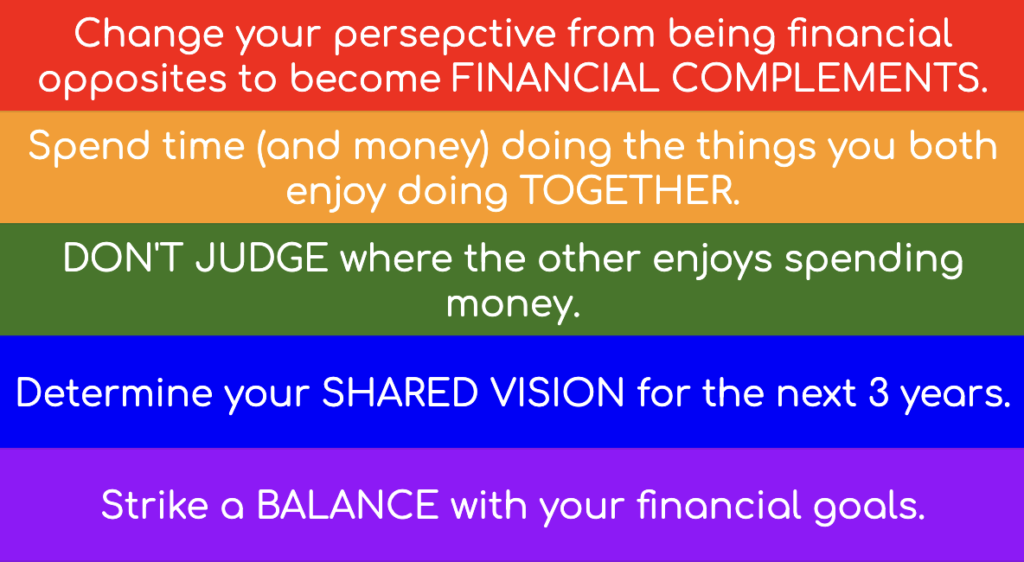

Money and Relationships: 5 Tips to Overcome Money Differences and Have a Happy Marriage
Does talking about money in your relationship often end in an argument?
Are you at the point where you avoid talking about money altogether?
You’re not alone!
Money conversations can be challenging…BUT they don’t have to be.
Talking about money is vital for a happy relationship (and thriving finances). The good news is there are proven techniques that will help you transition from money rivals to money teammates.
I’ll share the 5 tips for a happy marriage based upon my years of research and helping clients get on the same page and reach financial success.
Let’s dive in by first pinpointing why money and relationships don’t always seem to mix.
Table of Contents
What gets in the way of thriving money and relationships?

Most married couples (and financially intertwined couples) start off meaning well. They try to sit down and talk about budgeting and their financial goals, but they rarely seem to end up on the same page. Why is that?
Each person brings their unique money mindset and background to the relationship, and sometimes it can seem like mixing oil and water.
There are innate challenges to having an effective conversation about money. But even though that’s the case, we can bring things together once we recognize what they are.
But let’s start with where the money conversation can get derailed.
How many of these sound like your relationship?
We were raised differently with money
Did one of you grow up where money never seemed to be an issue and the other where money was tight and it was tough to make ends meet?
Did your parents argue about money or did they work together?
Were you involved in any of the financial conversations or did they think it wasn’t appropriate to talk about it with you?
As kids, we either run towards our parents’ example or we run in the exact opposite direction.
No two people were raised exactly the same. And even if they were, they may end up with differences. Case in point, how similar are you to your siblings even though you were raised in the same household?
Differences in upbringing with money can lead to tension. More on how to work through it later…
Income disparity in relationships
Even the most well-meaning of relationships have issues if there is one “breadwinner” in the family.
The breadwinner can sometimes be controlling since “they are making the money” which often influences the opposite effect in their spouse. Rather than feeling controlled, they rebel and spend, spend, spend or even hide spending from them. (It’s psychology folks.) It can get pretty toxic on the extremes.
But even the relationship with a supportive breadwinner has its challenges.
The spouse who isn’t explicitly contributing financially to the family often feels like they’re not pulling their weight. They harbor a lot of guilt around spending and feel like it’s not theirs to spend.
Both relationships can have money issues because of the difference in income.
Was there a debt disparity going into the relationship?
This is very similar to the income disparity. Either the spouse without the debt wants the other to work their way out of it, or the person with the debt can feel really guilty about it and want to get out of it on their own despite a supportive relationship.
This is especially true with student debt, but also with credit card debt.
It can be really tough to look at your budget or balance sheet when you see that the payments and debt are a constant reminder of that for either one of you.
Did one of you bring more assets to the relationship?
Maybe one of you was able to build up a nice nest egg before meeting while the other wasn’t able to get there. Maybe one of you had a house and the other was renting. Maybe there’s family money on one side but not on the other. Check out more family budgeting tips here.
The house example is a pretty common one I see where the couple feels the need to move into a new house that they say is “ours” instead of his or hers.
The debt situation can come into play here too.
I often see couples struggle over whether or not to use built up savings on one side to pay off the other one’s debt. There are a lot of ideas on this out in the personal finance realm but it still creates odd feelings even if both of you agree on what to do.
The closer your financial situation is when you meet, the less likely there will be an issue that comes out of this.
Family finance roles
How are the financial responsibilities divvied up? Who pays the bills? Who watches and creates your budget? Who monitors or manages your investments?
Every family needs to have a division of labor and personal finance is often one-sided with one person doing it all. That’s not a problem unless the one managing the family finances is doing it on an island.
It doesn’t matter if they took on that role because they want the control or the other just doesn’t want to be involved. Both people in a relationship need to be aware of the financial situation.
These are the five main factors I’ve found that derails money and relationships. To summarize, they are:
- Difference in how each of you were raised
- Income disparity in the relationship
- The amount of debt (or lack thereof) each of you brought to the relationship
- The amount of assets (or lack thereof) each of you brought to the relationship
- Financial roles and how they are divided up.
Each of these differences don’t have to mean a death sentence for your money or your relationship.
Based upon my years of research and experience helping couples, here’s how to overcome and have a happy marriage even if money has gotten in the way.
How do relationships deal with money differences?
At the end of the day, it’s not the actual money that causes the stress in the relationship. It’s about feeling judged, carrying guilt about past financial decisions, lack of trust, and even feeling like a failure.
It’s because we bring these feelings to the table that each person in the relationship needs to be supported by the other to work through with money differences.
The advice floating around is skewed toward either the optimal financial solution or the psychological/emotional solution (eg marriage counseling or therapy), but unless you have two accountants or two therapists in a relationship, there is a productive middle ground.
5 Tips to a Happy Marriage Even if You Argue About Money

Here are the tips that have worked in my marriage and for my clients to overcome these money differences:
Change your perspective from being financial opposites to being financial complements.
They say opposites attract and that certainly seems the case with money and relationships.
Think about it. Isn’t that different perspective what drew you together in the first place?
Don’t let your opposing views on how you handle money cause the arguments. Use it to become a stronger couple.
If one of you is more spontaneous with spending while the other is more structured, this is actually a good thing!
The spontaneous one can benefit from a little more structure and thoughtfulness, and the structured one will enjoy life more with a little spontaneity. Use these opposite characteristics to help each other live better!
Action Step: Take a moment to think about your money personality and that of your spouse/partner. How can you use this to your advantage as a couple?
Don’t judge what the other person enjoys spending money on.
My wife Anna always says to our kids, “Don’t yuck someone else’s yums.” I couldn’t agree more.
It means, don’t bash someone else’s finds appealing. We each have our own preferences.
When Anna and I go out to ice cream, she usually orders a mint option like peppermint or mint chip. To me, that’s like eating toothpaste and I don’t get it.
But we don’t get into an argument about the $3 she spends on it. Even though I don’t understand it, she likes it.
She doesn’t understand why I spend money on different kinds of coffee. To her it all tastes the same.
Wouldn’t it be silly for me to get on her case about peppermint ice cream and for her to give me a hard time about a cup of coffee?
The reality is that each person in a relationship has something they spend money on that drives the other one crazy and vice versa, and the most common money arguments I see comes from something their spouse spends money on that they just absolutely don’t understand.
This is where I see people most often get the idea to split the bills or have separate checking accounts, but it rarely solves the problem. But having a shared account and shared expenses doesn’t remedy the situation either. It goes beyond money here.
You may not understand why on earth your significant other spends money on things like music, technology, clothes, shoes, hair, golf, etc, but remember, you have something they don’t understand too.
Unless it’s a major cause of financial peril, accept their choice on this one thing. You most likely get the satisfaction from your thing in the same way they get satisfaction from theirs. Just like Anna with her peppermint ice cream and me with my coffee.
Action step: Think about the one thing your significant other spends money on that drives you crazy. Now think about the thing they give you a hard time about too. Commit to accepting this about each other. You get your thing, and they get theirs.
Spend time (and money) together doing the things you like
So often with kids, we lose focus on maintaining our bond as a couple. Their activities, school, and time demands overtake our lives.
Whenever I work with couples, I make sure they carve out room in their budget to spend time together. It’s ok to spend money in ways that will keep your relationship strong.
Maybe it’s getting a babysitter for date night or asking grandparents to take the kiddos out to breakfast so you can have a peaceful morning.
Action step: Take the time to think about the things you enjoyed doing as a couple before you had kids. Pick something you’d like to do, look at your calendars and reserve a time slot to do it.
What are your shared goals over the next 3 years?
Pick yourself up out of today and place yourself 3 years down the road.
What do you want your life to look like? What would you like to have experienced or made progress towards? What skills would you like to develop? Where do you want to be with your career and family?
It’s hard to get out of the day to day with young kids in the mix but take some time to think about where you’d like to be in the intermediate term.
Action step: Take the time to think about your 3 year goals independently. Then compare notes and see the overlap. Make a plan to plan and work towards that together.
Strike a balance with the financial goals you want to achieve
Couples are often torn with their financial goals. One wants to pay off debt while the other may want to save money or invest for the long term.
In my experience, the best financial plans are ones that work for both people in the relationship. It’s not about choosing one or the other, it’s about doing both.
For example, a couple with credit card debt and not much money in their bank account doesn’t have to go all in on paying off a credit card or building up their emergency fund.
Yes, the financially optimal path may say otherwise, but if both people aren’t on board, then neither goal will get accomplished. That is so much worse than going for a less optimal route.
I could write an amazing financial plan for a couple, but it makes no difference if it doesn’t get done.
If you agree on your path, then go for it. If you don’t, find that balance and do each of your top priorities rather than arguing and making zero progress.
Action step: Do you feel comfortable with cash in the bank, being debt free, or investing for the future? How does your spouse / partner / significant other feel? Figure out the next step that each of you want to accomplish and get moving on the shared goal or split the goal.
Money and relationships CAN mix
Here’s the summary of the 5 steps to improve your money and relationships:

Now that you know what gets in the way of relationships and how to get on the same page, have at it!
Start by going through these action steps. If you don’t want to do all 5, pick just 1 of them that resonated most to you.
As always, I’m here to help if you need extra support.
Book a free 30 minute discovery session with me here to talk through your money and relationships and get a quick tip or two unique to your situation.




